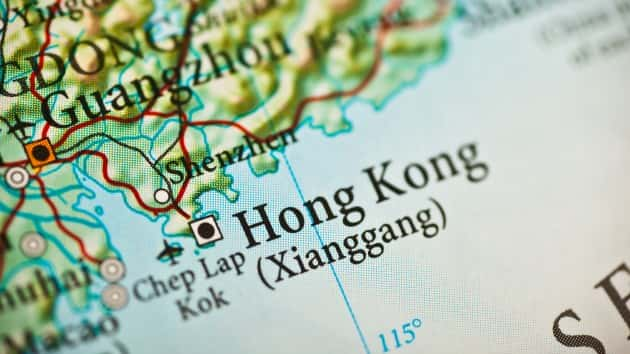
pawel.gaul/iStockBy CONOR FINNEGAN, ABC News
(WASHINGTON) — Hong Kong has lost its autonomy from the Chinese government, the Trump administration said in a historic report to Congress Wednesday, laying the groundwork for the territory to lose its special status under U.S. law and threatening its economic power.
The certification from the State Department marks a dramatic turning point for the territory as the Chinese government moves to implement a series of national security laws that it says is aimed to outlaw secession, subversion and foreign interference in Hong Kong, but that critics see as the death knell of the “one country, two systems” that makes the territory unique.
“No reasonable person can assert today that Hong Kong maintains a high degree of autonomy from China, given facts on the ground,” Secretary of State Mike Pompeo said in a statement.
The change in policy position does not yet have any effect, but it lays the legal groundwork for President Donald Trump to take executive actions to terminate Hong Kong’s special status under U.S. law, including looser export controls than mainland China; agreements on taxation, currency exchange and sanctions; and law enforcement cooperation, like extradition.
The end of those agreements could sink the estimated $66.8 billion of trade between the U.S. and Hong Kong, imperil the offices hundreds of U.S. companies have there and spell the death of Hong Kong’s status as an international financial capital.
Trump himself is determining the next steps now that the certification has been made, according to the top U.S. diplomat for East Asia and the Pacific, but it will be “considered” and “as targeted as possible to change behavior” by Beijing.
“We’ll do our best to ensure that the people of Hong Kong are not adversely affected to the best we can,” said Assistant Secretary of State David Stilwell. “Our approach is to mitigate the impact globally, on the Hong Kong people, while at the same time helping Beijing understand our concerns.”
But they are “not hopeful that Beijing will reverse itself,” he added — blaming the Chinese government for whatever comes next.
“This decision was made by the government in Beijing and not by U.S.,” Stilwell said. “We’re simply responding to what the PRC is doing.”
Some critics say that any steps to end Hong Kong’s special status, as opposed to sanctioning Chinese or Hong Kong officials, would play right into Beijing’s hands by punishing Hong Kong economically, while giving Beijing grounds to further tighten control.
“Changing Hong Kong’s status will not only undercut Hong Kong’s exports and harm its economy, but also invite Chinese retaliation, like changing the rules benefiting U.S. firms there. Mainland China will suffer a bit but probably not enough to substantially change Beijing’s calculus,” said Benjamin Friedman, policy director for Defense Priorities, a libertarian think tank in Washington.
But some of Hong Kong’s pro-democracy movement leaders welcomed the announcement as a key leverage point against Beijing.
“Our hope is that a drastic change of American policy will encourage them to reverse course on Hong Kong. For the past year, we’ve been fighting, first, against extradition arrangements with China and, now, a sweeping national-security law. The world must not turn a blind eye.,” tweeted Joshua Wong, one of the student leaders.
The Chinese government has not yet responded to Pompeo’s announcement. The editor of the Global Times, the Communist Party’s tabloid that often serves as a mouthpiece, bashed Pompeo on Twitter, a platform banned for the Chinese public, accusing the “habitually lying Secretary of State” of telling “the US Congress what Hong Kong national security law is before it’s even enacted.”
China’s National People’s Congress is expected to ratify Thursday a bill that set guidelines for national security legislation for Hong Kong, which would possibly deploy Chinese government security to the territory and bypass Hong Kong’s legislature by crafting and approving laws in Beijing.
Under the “one country, two systems” framework, Hong Kong was promised a certain level of autonomy, but also required to pass its own national security law, known as “Article 23.” That law has faced fierce public opposition in the last two decades, however, and it’s never been passed.
Last June, the territory’s chief executive Carrie Lam attempted to pass an extradition bill that sparked massive protests, with critics casting it as “Article 23-light.” After weeks of demonstrations and clashes with police that fueled more anger, Lam and the pro-Beijing bloc stood down on the extradition bill.
In the face of that opposition, the Chinese government is now using the National People’s Congress to take matters into its own hands and force the laws on the territory without the local legislature’s input.
“This is the end of Hong Kong. This is the end of one country, two systems. This is it. Make no mistake about it,” pro-democracy lawmaker Dennis Kwok said last week.
The certification to Congress is required annually under last year’s Hong Kong Human Rights and Democracy Act, which could also bring sanctions on Chinese or Hong Kong officials for their crackdown on democratic protests against creeping rule by Beijing. Although Pompeo’s statement said he made the certification, one congressional aide told ABC News that Congress has yet to receive the report.
“As usual with this administration, Congress has been kept out of the loop, in spite of strong, demonstrated bipartisan support for Hong Kong,” said Rep. Eliot Engel, D-N.Y., chair of the House Foreign Affairs Committee. “As the administration considers next steps, it is essential for Secretary Pompeo to work with Congress as is required by law.”
Copyright © 2020, ABC Audio. All rights reserved
